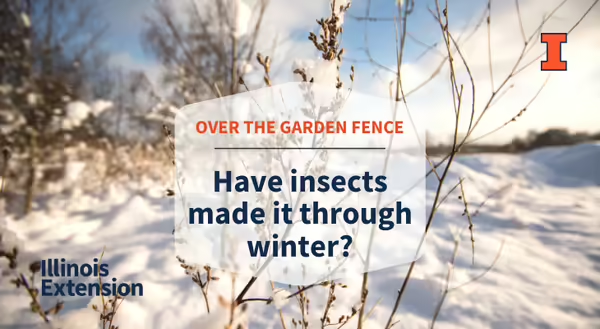
Outdoor insects have endured quite well, despite our hopes that either the cold or snow would have done them in for the 2021 gardening season. The cold is more of a factor than the snow. The snow will act as insulation for those overwintering insects at or below the soil line. (Side note: This also is why our perennials do so much better in the spring if covered with snow all winter compared to open and exposed to the wind and cold temperatures.)
Insects survive winter in a variety of ways
Those outdoor insects are overwintering as adults singularly or huddled together in clumps in cracks, crevices, or in leaf litter at the base of shrubs. Moths will be found as a cocoon attached to stems and twigs. Scale insects overwinter as eggs hiding under the protective scale of the female exposed to the elements on twigs, branches, and the trunk. Overwintering insect eggs will likely have their own version of “antifreeze” so they can survive until spring. Yet others overwinter in the soil as pupae to emerge in the late spring when there is something for them to eat. Some will burrow down below the frost line for the winter. Some, especially those associated with water, will overwinter as a nymph. Get tips on spring garden clean up and how it can impact insects in this blog by fellow Extension Educator Ryan Pankau.
Insects that do not overwinter
Not all of our insects are hunkered down for the cold season. Some winged insects actually migrate to locations with warmer weather. Other insects show up during our other seasons, making the trip via weather fronts that carry them thousands of feet above the ground.
Get to know your insects, their life cycles and their diets
Knowing a little bit about how insects may overwinter gives us an advantage if and when any control measures may need to be done. First thing to remember is if all those “bad guys” can overwinter, so do the “good guys.” This is the first line of defense you should take advantage of. Let beneficial insects be so they can help you. The second thing to know is if the damage in the home garden or flower bed is at a level that really needs to be managed. For example, eggplant riddled with flea beetle leaf feeding damage does not seem to impact yield for most of us. On the other gardening hand, cabbage loopers will likely ruin the head of cabbage if not addressed early.
How some of our common insects overwinter:
- Scales – as eggs above ground
- May/June Beetles – as mature larvae below the frost line
- Lady bugs – as adults
- Wasps – Usually singularity as an adult in cracks and crevices
- Box Elder bugs – as adults
- Sawflies – pupae in the soil
- Moths – pupae inside a cocoon made of silken thread above ground
- Honeybees – in hollow logs in nature (hives in captivity) as adults generating heat via consumption of honey
Want to know when a new blog posts? Subscribe to Over the Garden Fence.
About the author: Richard Hentschel’s expertise extends across several subject areas with specialties in lawn care, fruit tree production, woody ornamentals, and home and community gardening. During his 45-year career in horticulture and agriculture, Hentschel became a well-known and respected expert for commercial and homeowner audiences, industry organizations, and media. He retired from University of Illinois Extension in April 2022 with nearly 30 years of service as a Horticulture Specialist and Educator in northern Illinois.